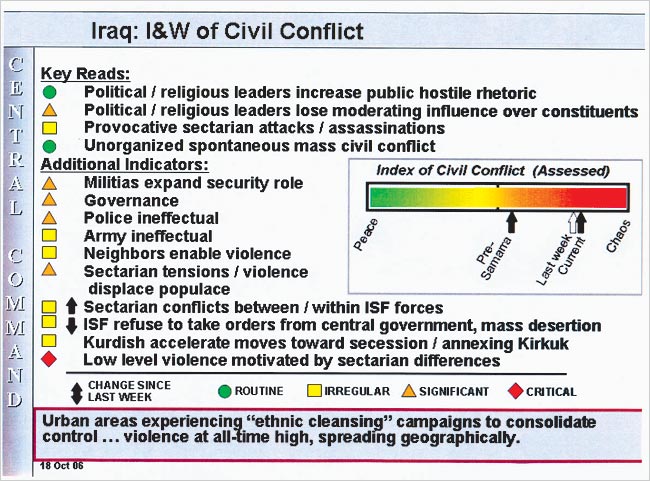Public hostile rhetoric
The secret of developing messages
November 3, 2006 3 comments
To resume after my short blog holiday (or, if you will, blogiday): a miscellany. A graphic was leaked from US Central Command that showed Iraq sliding along an “Index of Civil Conflict”. At far left is bucolic green “peace”. Right now, Iraq is hovering perilously close to bright-red “chaos”.

Peace vs chaos is an unusual binary opposition. After all, the normal opposite of peace is war, but then this war has been an unarguably noble pursuit, so we must find another name for the bad thing on the right-hand end. Chaos! Well, the conventional opposite of chaos is not peace but order. Yet there is no shortage in the historical record of orderly torture, say, or orderly killing. In fact, isn’t peace by its nature refreshingly chaotic? That seemed to be Donald Rumsfeld’s theory when he instructed us that “Freedom’s untidy”.
But enough quibbling. One important indicator of a slide towards chaos, according to this graphic, is that “Political/religious leaders increase public hostile rhetoric”. The NYT report explains that this “can be measured by listening to sermons at mosques and to important Shiite and Sunni leaders”. But why stretch your ears that far afield? George W. Bush has for many years now indulged not only in hostile rhetoric at public venues, but, as public hostile rhetoric may also denote, in rhetoric that is actually hostile to the public, insofar as it takes them for cretins.
In entirely unrelated news, millions of dollars of federal money is going to target unmarried adults up to the age of 29 in sexual “abstinence programs”.
Meanwhile, Christopher Hitchens appeared in a radio interview and confessed in passing:
I’m very hapless about statistics.
Let us gratefully accept this as a contrite retraction of Hitchens’s ham-fisted lunge at the, er, statistics in the recent Lancet report.
Bjorn Lomborg, the “sceptical” non-environmentalist, offered some eccentric opinions about the Stern report on global warming:
Mr. Stern sees increasing hurricane damage in the U.S. as a powerful argument for carbon controls. However, hurricane damage is increasing predominantly because there are more people with more goods to be damaged, settling in ever more risky habitats. Even if global warming does significantly increase the power of hurricanes, it is estimated that 95% to 98% of the increased damage will be due to demographics.
Hard to be sure, but I think this means that it’s people’s own stupid fault for living in New Orleans. D’oh!
The Pentagon set up a new unit, as the BBC reports, to “‘develop messages’ for the 24-hour news cycle and […] ‘correct the record'”. I like the notion of developing messages. Clearly it’s not just making shit up. There must already be a “message” there before it can be “developed”. That message is no doubt rigorously reality-based. But maybe here there is a nod to the technical idea of development in music, in which you can indeed just make shit up – you just need to make it appear to flow organically from what is there already.
Lastly, Tom DeLay bravely stood up for forced partial drowning:
“I don’t think water boarding is torture,” DeLay said. “My definition of torture is you physically harm someone by cutting them, by cutting their fingers, sticking things in their eyes, sticking their fingers in electric sockets. Water boarding is a frightening experience. But the person does not have physical damage.”
Cutting their fingers. Sticking things in their eyes. There is a lurid specificity to DeLay’s fantasies of torture, isn’t there? Probably we should make allowances for public hostile rhetoric, as long as it involves dreaming up imaginative ways to deal harm to “them”.


nice remark about “chaos”. It has a useful vagueness about responsibility. Homer personified “war” as a capricious god, somewhat like Fate, as if it wasnt the product of human intentions.
Rumsfeld’s phrase “freedom’s messy” now seems to me to refer to some Hobbesian state of nature, before “democracy” is imposed on it to make it orderly. Rumsfeld isnt usually called a neo-con, but that’s pure neocon elitist thought.
Perhaps my little collection is apropos here:
“Most men, after a little freedom, have preferred authority with the consoling assurances and the economy of effort it brings.” Lippmann
“The public must be put in its place, so that it may exercise its own powers, but no less and perhaps even more, so that each of us may live free of the trampling and the roar of a bewildered herd.” Lippmann
“While methods differ sharply from more brutal to more free societies, the goals are in many ways similar: to ensure that the “great beast,” as Alexander Hamilton called the people, does not stray from its proper confines.” Chomsky
…or to put it another way: as I am fond of saying, “Democracy is too precious to be entrusted to the masses”…